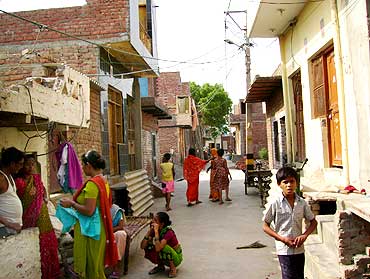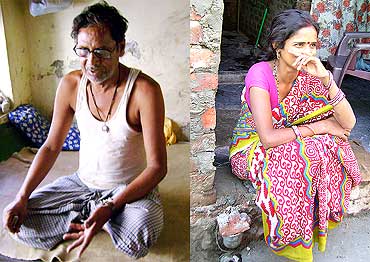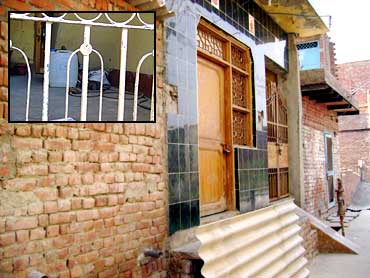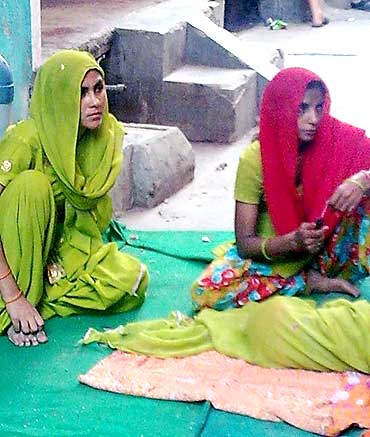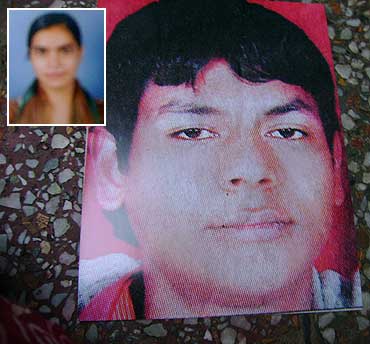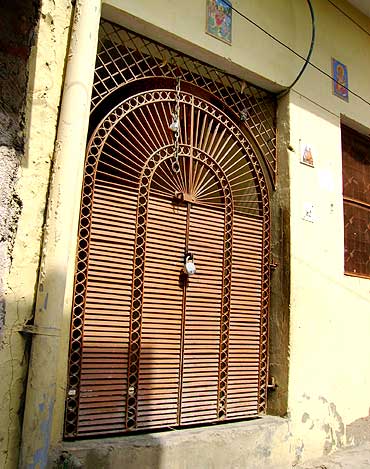 | « Back to article | Print this article |
Delhi honour killing: What happened that night
In the dingy lanes of a rural suburb, where a family allegedly murdered its own daughter and her boyfriend in the name of 'honour killing', a cold silence greets outsiders. Rediff.com's Anisha Ralhan travels to the 'other' Delhi, to probe some unanswered questions about the cold-blooded and remorseless murder that has shaken the nation.
Two dramatically different versions of Delhi co-exist in the heart of the city. Right now, the first one is being spruced up like a soon-to-be bride, under the facade of modernisation for the upcoming Commonwealth Games.
And voila! Meet her diabolic twin that perpetrated the brutal murder of an innocent couple in love under the infernal shadow of honour killing.
Here, in the mosquito infested lanes of Swarup Nagar in north-east Delhi, Asha Saini, 19, and her boyfriend Yogesh, 20, met a gory end allegedly at the hands of her family. On Sunday night, the girl's family is said to have beaten up the couple and electrocuted them at her uncle Omprakash's flat in the sparsely populated colony.
The girl's family had disapproved of Asha's relationship with Yogesh, a driver, and had asked the boy to back off.
According to Omprakash's next-door neighbour and eye-witness Umesh, Yogesh had been summoned to the Swarup Nagar flat, where the girl had been detained by her uncle and aunt since the last 20 days.
'The boy was wailing, the girl was pleading for his life'
A few minutes later, says Umesh, the girl's aunt was heard screaming in the balcony about Yogesh's arrival. An infuriated Omprakash then attacked the boy with a stick, says Umesh.
The neighbours tried to intervene but were curtly asked to mind their own business. Asha's cousin, Sanjeev, dispersed the curious onlookers.
The girl's parents also reached the flat soon and the enraged family allegedly tortured the couple for hours.
"From 2 am onwards I could hear the boy wailing. The girl was pleading for his life. I could sense something was fishy but couldn't communicate with anyone as I had no access to a telephone at that hour," said Umesh.
At approximately 4 am, Umesh saw the girl's family scurrying out of the house, but the couple was missing.
He told rediff.com that had he not witnessed the whole drama in his adjacent verandah, the murder would never have been accounted for.
"It seemed the family intended to dispose of the two dead bodies in the Maruti car the boy had arrived in. They brought the car very close to the gate. But sensing my presence, they took the car back to its original spot and rode away on three motorbikes," he says.
The three other neighbouring families had left before sunrise, said Kalpana, another neighbour, possibly due to Sanjeev's threats and a fear of police investigation.
'It would have been a matter of shame for them'
The police found the dead bodies with multiple bruises and burns at 8 am on Monday. They nabbed the girl's uncle and her father Suresh Kumar Saini, who admitted to the barbaric crime.
According to the police, the girl's family had taken the extreme step as the boy hailed from a lower caste.
"This part of Delhi is deeply enmeshed in rural culture -- of judging a person by his caste. In this case, Asha's family was wealthier than Yogesh's and it would have been a matter of shame for them to have consented to a marriage between unequal partners," explained a senior officer at the district police station.
Asha was reportedly engaged to a man from Sonepat who had been chosen by her family.
There are many questions that remain unanswered about the official version of the murder.
Firstly, was the boy summoned by the family to Omprakash's house, indicating a preplanned murder, or did he come there to meet his girlfriend and was caught by the family?
'It was a planned conspiracy'
The alleged murderers -- Asha's father Suresh Kumar Saini and uncle Omprakash -- say they attacked the couple in a fit of rage after finding them in a compromising position on the terrace.
Saini reportedly told the police that it was natural for a father to react so vehemently after seeing his daughter thus.
But Yogesh's sister Renu claims, "It was a planned conspiracy to kill my brother. I saw the girl's mother waiting for my brother outside our Gokulpur apartment. Before that, I heard Asha pestering him to meet her."
According to ey-ewitnesses, the couple spent barely two minutes together before they were attacked with sticks and metal rods. They believe that the girl's uncle might have convinced Asha to call Yogesh over.
'Which mother can bear the pain of her only daughter?'
What was the role of Asha's mother and her aunt in this brutal episode?
The girl's relatives say the mother and another female relative were asked to leave the crime spot by the men, as they were sobbing at Asha's plight.
"They are completely innocent as they had been sent away before the murders happened. Which mother can possibly bear the pain of her only daughter, leave alone murder," they claimed.
But Umesh, an eye-witness, is confident about having spotted the entire family leaving the house in the wee hours of Monday, without an iota of remorse on their faces.
'The government treats the crime as an ordinary murder'
The news of this honour killing may have sent tremors across the country but such cases are not entirely alien to one of the most developed cities in Asia.
In May, a Delhi girl was smothered to death in her Jharkhand house for her relationship with a journalist from a lower caste.
According to a senior police officer, "Cases of elopement and couples being harassed by parents are reported on a daily basis. Honour killing seems to have become a trend among the rural population of the city."
The absence of a separate law to punish the perpetrators is cited as the prime factor for the proliferation of honour killings.
"The Indian Penal Code has no separate law for the exterminators of their own kin. Our government treats the crime as an ordinary murder and imposes life imprisonment or the death penalty only in the rarest of rare cases," say the police.
Enforcing strict separate laws for honour killings, empowering women to assert their rights to choose a bridegroom, and educating the rural population about the redundancy of thte caste system could perhaps curb the rising trend, they say.
